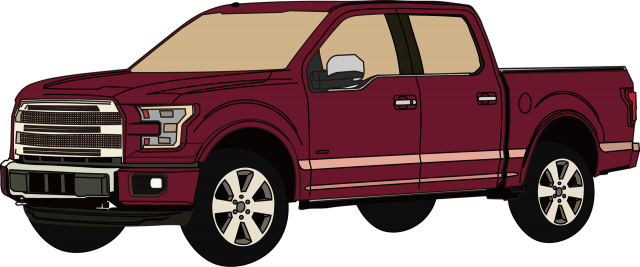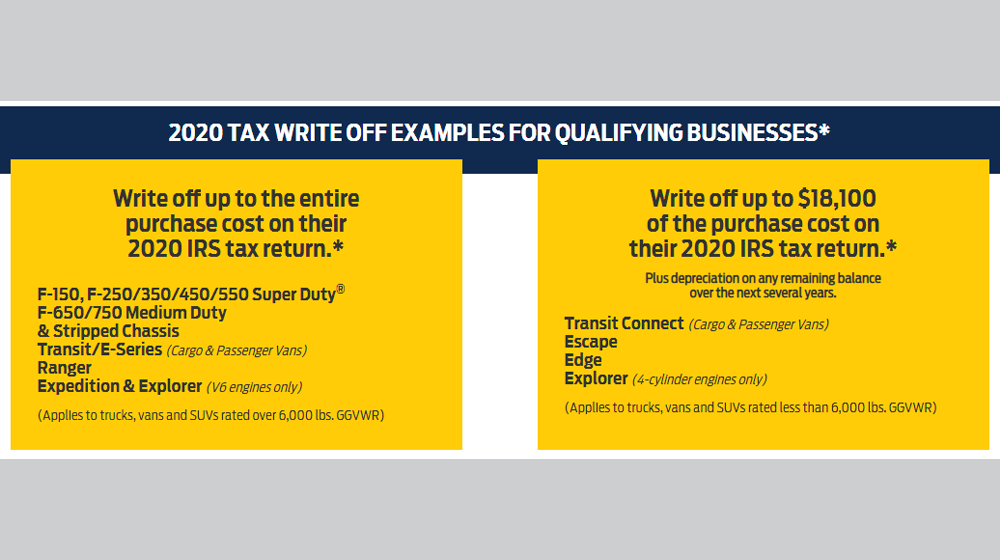
The irs provides a deduction when a business owner purchases a vehicle that weighs more than 6,000 pounds. If you have any questions about this deduction, give us a call at the office.

To qualify as a “heavy” vehicle, an suv, pickup or van must have a manufacturer�s gross vehicle weight rating (gvwr) above 6,000 pounds.
Tax deductions for vehicles over 6000 lbs. Suvs and crossovers with gross weight above 6,000 lbs. The vehicle is still eligible for either expensing of up to the $25,500 suv expensing limit or 100 percent bonus depreciation. Do not have a cap if bonus depreciation is taken.
They are, however, limited to a $26,200 section 179 deduction in 2021. Vehicles that can be written off for business include: Is a vehicle over 6000 lbs tax deduction?
The irs allows up to $25k up front depreciation (100%) for suv over 6,000 lbs plus 50% bonus depreciation for new vehicles which will get close to that figure. Also do not have a cap. The vehicle must be used for business purposes at least 50% of the time.
This is key because the more your vehicle weighs, the more you. Cars vans and light trucks year 1 $3,160 $3,460 Gross vehicle weight can qualify for at least partial section 179 deduction and bonus depreciation.
Further, you must reduce the $25k by the personal use percentage. Pickups and vans with no rear passenger seating that are above 6,000 lbs. The section 179 deduction and bonus deprecation deals are only available for an suv, pickup, or van with a manufacturer’s gross vehicle weight rating (gvwr) above 6,000 pounds that is purchased (not leased).
As a general rule, purchasing a 6,000 pound vehicle may help you qualify for up to $25,000 in deductions. The limitation on suvs (sports utility vehicles) is not applicable to commuter vans, lcvs (large commercial vehicles) or buses. 65 rows internal revenue code, section 179 deduction allows you to expense up to $25,000 on vehicles(one.
According to the irs, the maximum tax break that you will receive for placing a heavy vehicle in use will be $25,000. The irs provides a deduction when a business owner purchases a vehicle that weighs more than 6,000 pounds. Now the one stipulation for taking accelerated depreciation on the vehicle tax deduction is that the vehicle must weigh over 6,000 pounds.
And that weight needs to be gvwr or gross vehicle weight rating, which is the max loaded weight of. Section 179 of the irs tax code essentially allows businesses to deduct the full purchase price of certain equipment and vehicles purchased before december 31st of. The vehicle must be driven over 50% of the miles for business purposes.
Section 179 deduction dollar limits. Irc § 179 (b) (5) (a). The vehicle purchased must weigh over 6,000 pounds, according to the gross vehicle weight rating (gvwr), but no more than 14,000 pounds.
For tax years beginning in 2021, the maximum section 179 expense deduction is $1,050,000. The vehicle purchased must weigh over 6,000 pounds, according to the gross vehicle weight rating (gvwr), but no more than 14,000 pounds. If you have any questions about this deduction, give us a call at the office.
Are not subject to depreciation (including bonus depreciation) limits. Suvs and crossovers with gross weight above 6,000 lbs. The section 179 deduction is applicable for vehicles that have a rating between 6,000 pounds gvwr and 14,000 pounds gvwr for up to $25,000 of the vehicle’s cost.
Section 179 (a) allows a taxpayer to elect to treat the cost (or a portion of the cost) of any § 179 property as an expense for the taxable year in which the taxpayer places the property in service. • obvious “work” vehicles that have no potential for personal use typically qualify. The 6,000 gross vehicle weight tax deduction when a vehicle purchased for business purposes weighs over 6,000 pounds, the irs allows the owner of the vehicle to claim up to $25,000 in deductions.
To qualify as a “heavy” vehicle, an suv, pickup or van must have a manufacturer�s gross vehicle weight rating (gvwr) above 6,000 pounds. Under the current tax law, vehicles with a gvwr of 6,000 lbs or more are exempt from annual depreciation caps. Larger vehicles suvs with a gross vehicle weight rating above 6,000 lbs.
A random thought came to my mind the other day about the r1t is whether or not the r1t could be eligible for the tax deduction on vehicles over 6,000 pounds. Can you write off a vehicle over 6000 pounds? Delivery type vehicles such as classic cargo vans or box trucks with no passenger seating.
Which puts it incredibly close to the 6,000 pound threshold for the section 179 tax deduction. Other vehicles can also qualify for valuable tax savings through section 179. What is the 6 000 pound vehicle tax deduction?
Are capped at $25,000 if section 179 is taken. To qualify as a “heavy” vehicle, an suv, pickup or van must have a manufacturer’s gross vehicle weight rating (gvwr) above 6,000 pounds. Gross vehicle weight can qualify for at least a partial section 179 deduction, plus bonus depreciation.
The most recent thing i�ve seen about the r1t�s curb weight is that it will weigh 5,886 pounds. This limit is reduced by the amount by which the cost of section 179 property placed in service during the tax year exceeds $2,620,000.also, the maximum section 179 expense deduction for sport utility vehicles placed in service in tax years beginning in 2021. It’s easy to find attractive vehicles with gvwrs above the magic 6,000 pound threshold.